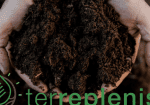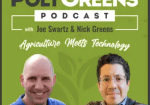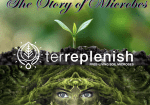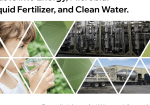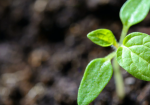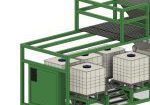My Summer in Sustainability: A Personal Statement from Our Summer Intern, Joseph Tyler
August 20, 2021
The enormity of climate change is overwhelming and stressful. Frankly, it’s horribly depressing. With glaciers the size of city buildings melting, rising waters encroaching on peoples’ homes, fossil fuel emissions choking the air and wildfires ravaging entire countries, the issue of climate change appears entirely too large to combat. Whether at a societal or individual level, it’s impossible to escape a feeling of dire helplessness as the world seizes and convulses under the toxic weight of our civilization.
Despite this bleak outlook, I’m eager to rush into the thick of this problem. This desire and passion stems from an evolving consciousness, born from increased awareness and first-hand experience. Environmental calamities in my native state, Michigan, served as the catalyst for this increased awareness. The Flint Water Crisis and the ubiquity of PFAS (Per- and Polyfluoroalkyl Substances) in countless bodies of water drove me to stress the importance of a resource I utterly took for granted: clean water. My consciousness evolving in the face of distressing environmental degradation, I began to understand that it is both my personal job and the duty of my generation to guarantee clean water and a clean environment for future generations.
Personal experiences fueling my passion to act as a steward of the environment stem from my background as a bartender. I’ll forever possess a passion for the hospitality industry but working in restaurants opened my eyes to the problems of food waste and plastic waste. The US Department of Agriculture estimates that between 30-40% of our total food supply is wasted every year, and it was staggering to see this stat come to life in the restaurant industry. As for plastic waste—the World Economic Forum estimates a full garbage truck worth of this is dumped into our oceans every minute—I was able to grab a pulse on this problem through waste generated from plastic straws, flatware and cups. It was dizzying taking the amount of food and plastic waste from a single restaurant and multiplying it by all restaurants, grocery stores and individual businesses across our nation and throughout the world.
My environmental consciousness, born from experience and heightened awareness, has served as a guiding principal as I work to complete my MBA this December. All the courses I’ve taken—whether accounting, economics or finance—have been completed with an eye towards contributing to environmental sustainability. This has been a rather abstract and ambiguous goal, guided by a general desire to solve the sweeping problems of pollution and waste. Yet, upon becoming an intern with Terreplenish—an upstart in the regenerative farming space—I realized that contributing to sustainability and acting as a steward for the environment manifests itself in a myriad of ways.
Terreplenish uses food waste to produce an organic, microbial soil amendment that farmers of all stripes can use to regenerate their soil. Given my frustration with food waste, the fact that Terreplenish found a way to divert this waste and create value grabbed my attention. Working with our team and speaking with farmers who possess decades of agricultural experience, I realize that the true problem we’re addressing is the state of our soil.
As a self-proclaimed environmentalist, I was blissfully unaware of the magnitude of this issue. For all my poetic waxing discussing the importance of reducing our emissions and ceasing the trashing of our planet, I completely ignored a critical component of our environment I see and walk on every day: soil. Soil isn’t very glamorous in the public eye but, without it, we’re all unquestionably doomed. It’s responsible for the growth of 95% of our food—providing humanity with vital nutrients—all the while absorbing carbon and retaining water (a critical capability given the increased flood risk large parts of the world face). As with many of the components of the environment, our soil faces an existential threat. David R. Montgomery, author of “Growing a Revolution: Bringing Our Soil Back to Life” (a must read if you want to learn more about this issue), estimates that at least a third of the world’s agricultural land has been degraded. This degradation is recklessly chugging on, as a half percent of our global crop production is lost to soil degradation each year and, in the United States alone, soil on cropland is degrading at a rate 10 times faster than it can be replenished. The picture here is bleak, as it is with most of the issues facing our environment, but there is a positive path forward.
Montgomery warns that it takes nature centuries to build a fertile inch of topsoil but—considering what I’ve learned at Terreplenish—I believe there’s a dedicated community that can begin solving this problem. Farmers across the country follow organic practices, particularly the planting of cover crops and avoidance of tilling that restore our soil, and they are partnering with forward thinking companies—such as Terreplenish—to do so. This spirit of human ingenuity and progress fills me with hope, while providing a logical conclusion to my musings on environmentalism.
I believe creating a comprehensive response to climate change—in addition to addressing racial discrimination, but that’s a topic for another post—is the primary responsibility of our generation. Like many others, I’ve been overwhelmed by the enormity of this challenge and the likelihood we won’t solve it. Terreplenish has taught me that you need to pick a place to start; trust me, there’s no shortage of problems or opportunities! Once you’ve picked a place to begin—which, for me, is improving the health of our soil—learn all you can from those who’ve been toiling in the trenches. Become a part of the community and focus all your efforts on contributing to the solution in the best manner you can. Acting on climate change necessitates a collaborative undertaking where individuals specialize in addressing specific problems. With the diverse skills, backgrounds, and experiences of our society, we will create a mosaic of movements towards sustainability. With this mosaic, a problem which is overwhelmingly enormous will become surprisingly manageable.
Related Posts
Grow Better with Terreplenish®
Proven nitrogen-fixing results from our blend of proprietary
free-living nitrogen-fixing microbes.
100% all natural and OMRI listed for organic use on:


